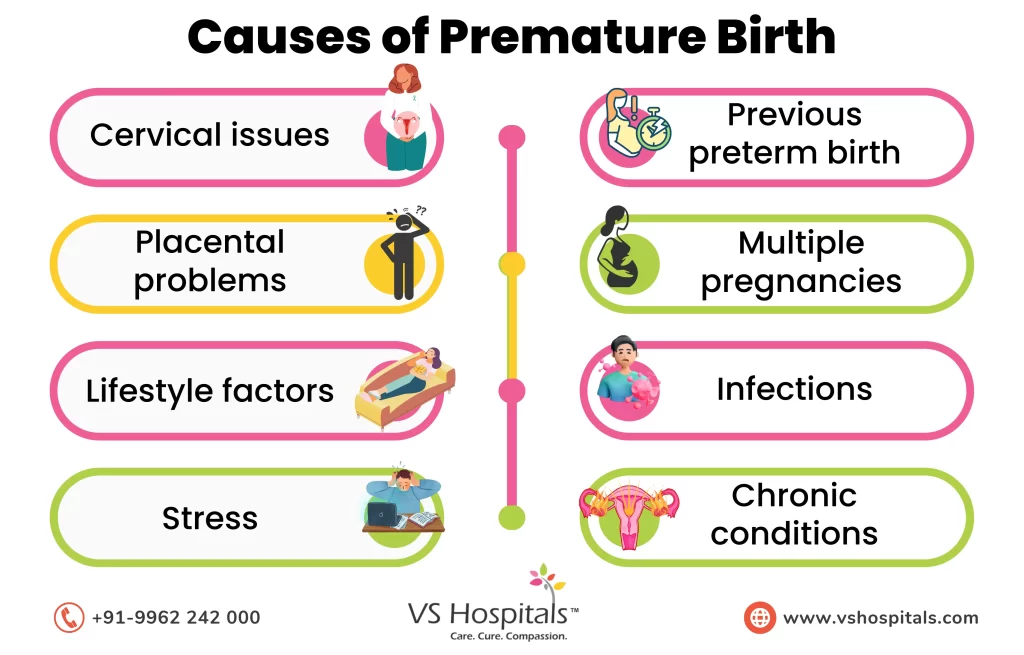Premature birth, which is defined as birth before 37 weeks of gestation, can have serious health implications for both the mother and the baby. Premature babies may be prone to causes of premature birth with an increased risk of infections and other complications. In order to prevent premature birth, expectant mothers can take a number of steps to ensure a healthy pregnancy.
Causes of Premature Birth
The following are some of the causes that lead to premature birth.
- Certain medical conditions during pregnancy, such as preeclampsia, gestational diabetes, incompetent cervix, and placenta previa.
- Poor nutrition, and inadequate weight gain.
- Exposure to certain toxins or pollutants.
- Multiple pregnancies, such as twins or triplets.
- Certain infections, such as group B streptococcus and bacterial vaginosis.
- Smoking and alcohol consumption.

Tips for Preventing Premature Birth
While the causes of premature birth are complex and varied, identifying and managing risk factors can help reduce the likelihood of preterm delivery. Here are some tips for preventing premature birth:
Get Early and Regular Prenatal Care
Prenatal care is important for monitoring the health of both the mother and the developing baby. Early and regular prenatal care can help identify and address any potential issues that could lead to premature birth. Expectant mothers should attend all scheduled prenatal appointments and inform their healthcare provider of any concerns or symptoms they may be experiencing.
Maintain a Healthy Diet
Eating a healthy and balanced diet is essential for both the mother and the baby. Expectant mothers should understand the causes of premature birth and eat a variety of fruits, vegetables, whole grains, and low-fat dairy products. They should also limit their intake of processed foods, sugary drinks, and caffeine.
Stay Hydrated
Drinking plenty of water is important for the health of both the mother and the baby. Expectant mothers should aim to drink at least eight to ten cups of water per day. Staying hydrated can help prevent premature contractions and promote healthy amniotic fluid levels.
Manage Stress
Stress can have a negative impact on pregnancy and may increase the risk of premature birth. Expectant mothers should take steps to manage stress, such as practicing relaxation techniques like meditation, yoga, or deep breathing. They should also get plenty of rest and avoid overexerting themselves.
Avoid Harmful Substances
Exposure to certain substances can be the causes of premature birth. Expectant mothers should avoid smoking, using drugs, and consuming alcohol. They should also avoid exposure to chemicals and toxins in the workplace or at home.
Exercise Regularly
Moderate exercise will be beneficial for both the baby and the mother. Expectant mothers should talk to their healthcare provider about what types of exercise are safe during pregnancy. Walking, swimming, and yoga are often recommended. Exercise can avoid the reasons for premature birth as it helps in circulation, reduce stress, and prepare the body for labor and delivery.
Get Enough Rest
Getting enough rest is important for the health of both the mother and the baby. Expectant mothers should aim to get seven to eight hours of sleep per night. They should also take breaks throughout the day and avoid overexerting themselves.
Learn the Signs of Preterm Labor
Preterm labor can occur before 37 weeks of gestation and may lead to premature birth. Expectant mothers should learn the signs of preterm labor, which can include contractions, pelvic pressure, back pain, vaginal bleeding, and a change in vaginal discharge. If they experience any of these symptoms because of the causes of premature birth, they should contact their healthcare provider immediately.
Treat Underlying Health Conditions
Certain underlying health conditions, such as high blood pressure, diabetes, and infections, can be the reasons for premature birth. Expectant mothers should work with their healthcare provider to manage any underlying health conditions and follow any recommended treatment plans.
Avoid Unnecessary Interventions
Some interventions, such as elective induction of labor or c-section, can increase the risk of premature birth. Expectant mothers should discuss any planned interventions with their healthcare provider and ask questions to ensure that the intervention is necessary and appropriate.
Conclusion
To sum up, it is important to remember that overcoming the causes of premature birth with the right support and care, can help premature babies go on to thrive and live healthy lives. By taking steps to reduce the risk of premature birth, expectant mothers can provide their babies with the best possible start in life.
Read also Early Pregnancy Mood Swings.
